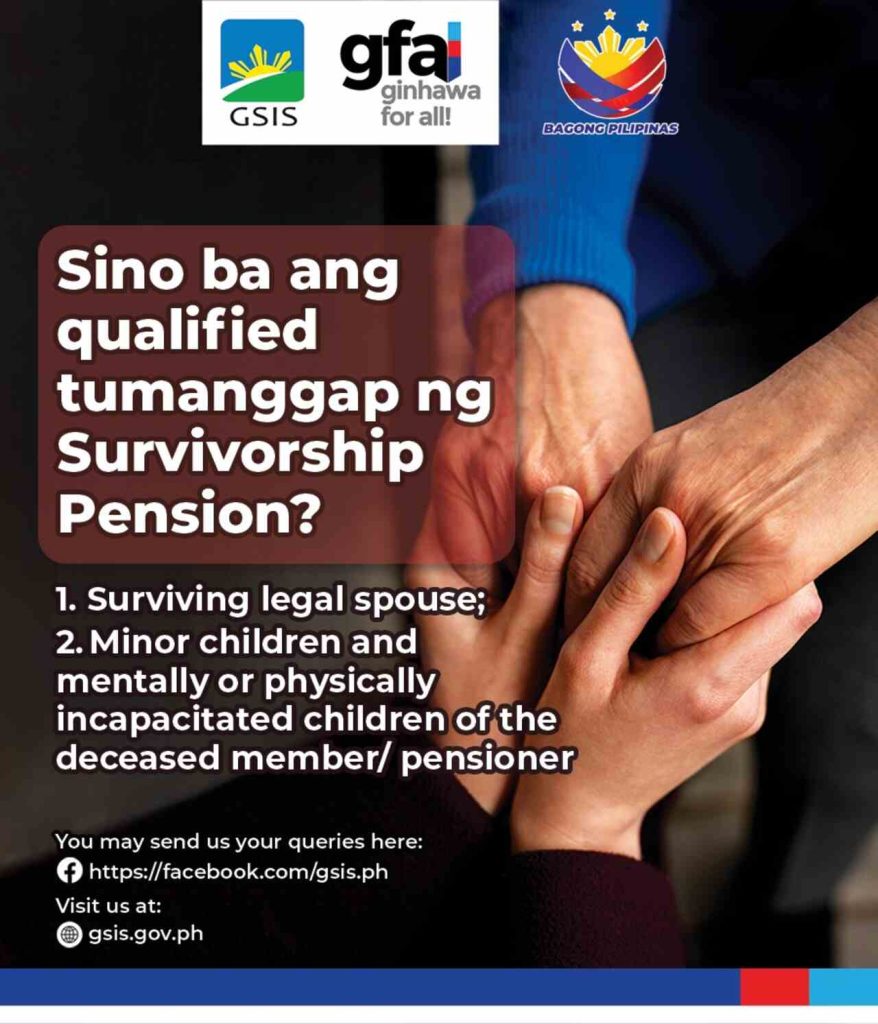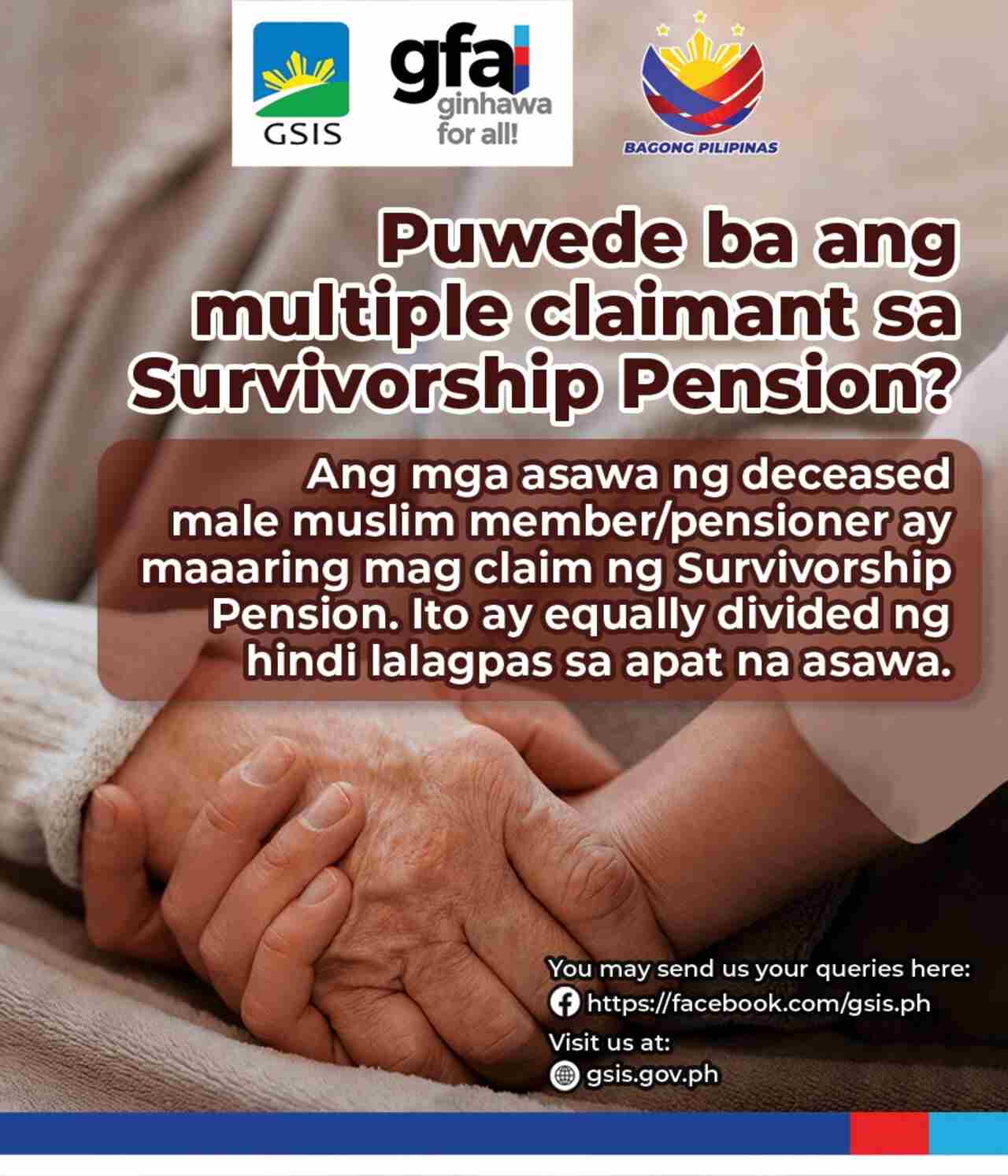When a Government Service Insurance System (GSIS) member or pensioner passes away, their beneficiaries may apply for survivorship benefits. These benefits, provided under Republic Act No. 8291 (RA 8291), offer financial support through cash payments or pensions to eligible family members or legal heirs. This includes Muslim members, whose claims are guided by Presidential Decree No. 1083 (PD 1083), which allows male members to have multiple wives and dependent children across different legal marriages.
Understanding the guidelines, eligibility requirements, and the application process is essential to ensure smooth processing of claims. This comprehensive guide provides all the necessary details to help beneficiaries claim the survivorship benefits they are entitled to.
Program Overview
Survivorship benefits are financial support provided to the beneficiaries of deceased GSIS members or pensioners. These benefits aim to ease the financial burden caused by the loss of a family member. Depending on the circumstances of the deceased member’s employment and contributions, these benefits may come in the form of a pension, a lump-sum cash payment, or both.
Muslim members are entitled to survivorship benefits under RA 8291 and PD 1083. PD 1083, the Code of Muslim Personal Laws, acknowledges specific family structures, such as the possibility of having multiple legal spouses, which affects the distribution of benefits. GSIS has enacted Policy and Procedural Guidelines No. 344-19 (PPG 344-19) to institutionalize the process of claims for Muslim members, ensuring fair and lawful distribution to all eligible beneficiaries.

Benefits
The program provides assistance and support to the beneficiaries of deceased GSIS members or pensioners, offering the following benefits:
- Survivorship Pension
- For active or inactive members with at least 15 years of paid premiums:
- Surviving spouse and dependent children receive a monthly pension equivalent to 50% of the deceased member’s Basic Monthly Pension (BMP).
- For active or inactive members with at least 15 years of paid premiums:
- Cash Payment (Lump Sum):
- For active members with 15 or more years of paid premiums:
- Primary beneficiaries receive 18 times the BMP.
- For active members with 3 to less than 15 years of paid premiums:
- Primary beneficiaries receive a lump sum equivalent to 100% of the Average Monthly Compensation (AMC) for every year of service.
- For separated members over 60 years old who did not claim separation benefits:
- Primary beneficiaries are entitled to a lump sum equal to 100% of AMC for each year of service, with a minimum of Php 12,000.
- For active members with 15 or more years of paid premiums:
- Dependent Child Pension
- Up to five youngest dependent children, including those incapacitated before 18 years old, are entitled to a monthly pension equivalent to 10% of the deceased member’s BMP.
- Minimum Lump-Sum Benefit
- If the member died under 60 years old with 3 to less than 15 years of paid premiums:
- A minimum benefit of Php 12,000 is provided to primary beneficiaries.
- If the member died under 60 years old with 3 to less than 15 years of paid premiums:
These benefits aim to provide financial stability and support to the family members left behind.
Target Beneficiaries

This GSIS program is designed to provide financial assistance to specific groups of beneficiaries in the following order of priority:
- Primary Beneficiaries
- Surviving spouse (or multiple legal wives for Muslim members, divided equally).
- For Muslim male members, the benefits are equally divided among all legal wives.
- For Muslim female members, the benefits are given to the sole surviving husband.
- Surviving spouse (or multiple legal wives for Muslim members, divided equally).
Note: Legal wives of Muslim members equally share the survivorship pension and/or cash payments.
- Up to five youngest dependent children under 18 years old, or those incapacitated before reaching the age of majority.
- Secondary Beneficiaries
- Dependent parents of the deceased member.
- Legitimate descendants, following the rules for dependent children.
Note: For Muslims, dependent children from different legal marriages will also share the dependent pension equally.
- Legal Heirs: In the absence of primary and secondary beneficiaries, the benefits are distributed to legal heirs in this order:
- Parental grandfather and grandmother.
- Full siblings (brother or sister).
- Consanguine siblings (half-blood relatives from the father’s side).
- Uterine siblings (half-blood relatives from the mother’s side).
Note: For secondary beneficiaries or legal heirs, benefits are distributed equally among all eligible individuals.
This structured hierarchy ensures that survivorship benefits are allocated fairly and equitably among eligible recipients.
Disqualification and Termination of Benefits
Survivorship benefits may be disqualified or discontinued under specific conditions:
- For Spouses: Payment of the survivorship pension is terminated if the spouse remarries, cohabits, or enters into a common-law relationship. However, this rule does not apply to Muslim male beneficiaries, who are allowed up to four legal wives under PD 1083.
- For Dependent Children: Benefits cease when the child reaches 18 years old or overcomes incapacity.
- If a beneficiary becomes disqualified or passes away, their share of the benefits will be redistributed to other eligible beneficiaries.
Eligibility for Survivorship Benefits
To claim the survivorship benefits, the following qualifications must be met:
- For Primary Beneficiaries (Surviving Spouse and Children):
- The surviving spouse must have been legally married to the deceased member or pensioner.
- Dependent children must be under 18 years old, or physically/mentally incapacitated before reaching the age of majority.
- For Secondary Beneficiaries (Parents and Descendants):
- Dependent parents must be living at the time of the member’s death and must provide proof of dependency.
- Legitimate descendants (such as grandchildren) may qualify in the absence of primary beneficiaries, subject to dependency requirements.
- For Legal Heirs:
- Legal heirs may only claim survivorship benefits if there are no primary or secondary beneficiaries.
- The distribution follows the legal order of succession as outlined above.
- For Deceased Members: The deceased member must meet any of the following conditions:
- Be an active member at the time of death with at least 3 years of paid premiums.
- Be an inactive member entitled to future benefits, such as separation or old-age pension.
- Be a pensioner already receiving old-age or disability benefits.
- For Muslim Members: Multiple legal wives and dependents may claim equal shares of the benefit according to Presidential Decree No. 1083 (Code of Muslim Personal Laws).
- Other Conditions:
- Claims must be filed within four years from the member’s date of death, except in cases where a funeral benefit application has been filed, which serves as constructive notice.
- If the member had received their separation benefit, survivorship benefits would no longer apply.
Requirements
To apply, applicants must prepare the following documents:
For Primary Beneficiaries (Married or Single)
- Duly accomplished Application Form for Survivorship Benefits
- PSA-issued or LCR-certified death certificate of the deceased member
- PSA/LCR marriage contract or certification from the Shari’a Circuit Court for Muslim members
- Affidavit of Surviving Spouse, indicating other spouses (if applicable)
- PSA/LCR birth certificates of dependent children
- Valid government-issued IDs of claimants
For Secondary Beneficiaries
- Death certificates of the deceased member and parents
- Birth certificates of claimants proving their relationship to the deceased member
- Affidavit of Surviving Legal Heirs
For Legal Heirs
- Affidavit of Legal Heirs
- Death certificates of parents and grandparents
- Birth certificates of siblings or other legal heirs proving their relationship to the deceased member
Step-by-Step Application Procedures
Step 1: Gather Required Documents
Compile all necessary documents based on your relationship to the deceased member. Ensure that all certificates are PSA-issued or authenticated by the local civil registrar.
Step 2: Accomplish the Application Form
Fill out the GSIS Application Form for Survivorship Benefits. Provide accurate details and attach all required documents.
Step 3: Submit the Application
Submit the completed application and supporting documents to your designated GSIS office. Applications can also be submitted online by emailing scanned copies (in PDF or JPEG format) to the GSIS office’s official email address. Note: When submitting online via email, make sure to Include a photo of the claimant holding their UMID card or two valid IDs.
Step 4: Wait for Processing
GSIS will review your application and verify the submitted documents. If any additional information is required, you will be notified.
Step 5: Receive the Benefit
Once approved, the survivorship benefits will be processed and disbursed according to the guidelines. Pensions are paid monthly, while lump-sum payments are issued in one transaction.
Important Reminders
For your reference, here are some important reminders worth taking note of:
- Four-Year Prescriptive Period: Survivorship benefit applications must be filed within four years from the member’s death. However, if a funeral benefit was previously claimed, it serves as a constructive notice for the survivorship benefit claim.
- Limit on Dependent Pensions: Only five dependent children, starting from the youngest, are eligible to receive pensions.
- Continuous Updates: Ensure your contact details with GSIS are updated to receive notifications about your claim status.
Video: Can the Children Enjoy Lifetime Pension Under the GSIS Survivorship Benefits
Find the answers to your most pressing questions about the GSIS Survivorship benefits by watching this video from Prof. Allan Noguerra MBA, LPT:
Summary
Applying for GSIS survivorship benefits can look like a complex process, but understanding the eligibility requirements, required documents, and application procedure can make it more manageable. These benefits provide essential financial support to the surviving family members of deceased GSIS members, honoring their years of service. For Muslim members, specific provisions under PD 1083 ensure fair and lawful distribution among multiple legal spouses and dependent children, reflecting their unique family structures. If you are filing the claim, submitting complete documents early will help you get the benefits you deserve when you need it.
